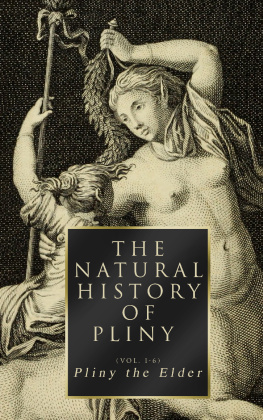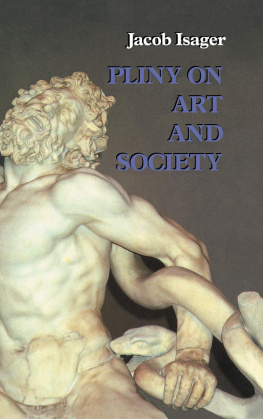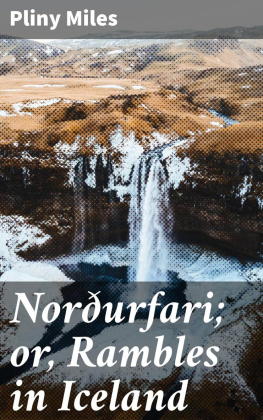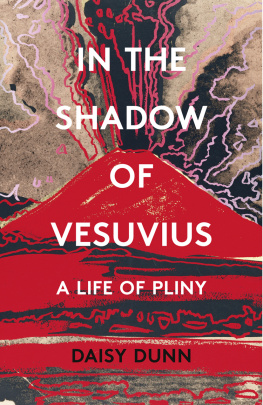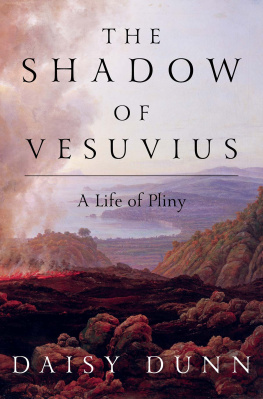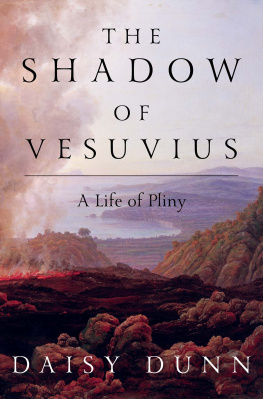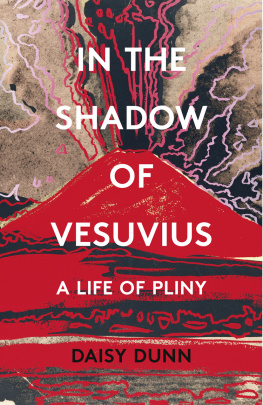Pliny the Elder
The Natural History of Pliny (Vol. 1-6)
e-artnow, 2022
Contact:
EAN 4066338120731
Volume I
PREFACE
The only translation of Plinys Natural History which has hitherto appeared in the English language is that by Philemon Holland, published in the latter part of the reign of Elizabeth. It is no disparagement to Hollands merits, as a diligent and generally faithful translator, to say that his work is unsuited to the requirements of the nineteenth century.
In the present translation, the principal editions of Pliny have been carefully consulted, and no pains have been spared, as a reference to the Notes will show, to present to the reader the labours of recent Commentators, among whom stands pre-eminent the celebrated Cuvier. It has been a primary object to bring to the illustration of the work whatever was afforded by the progress of knowledge and modern discoveries in science and art. Without ample illustration, Plinys valuable work would want much of the interest which belongs to it, and present difficulties scarcely surmountable by any one who has not made the Author his especial study.
In the first two Books, the text of Hardouin, as given in Lemaires edition (Paris, 1827), has been followed; in the remainder that of Sillig (Gotha, 1851-3), excepting in some few instances, where, for reasons given in the Notes, it has been deemed advisable to depart from it. The first two Books, and portions of others, are the performance of the late Dr. Bostock, who contemplated a translation of the entire work; but, unfortunately for the interests of science, he was not permitted to carry his design into execution.
Upwards of a hundred pages had been printed off before the present Translator entered on his duties; and as they had not the advantage of Dr. Bostocks superintendence through the press, some trifling oversights have occurred. These are, for the most part, corrected in a short Appendix.
THE LIFE AND WRITINGS OF PLINY.
Caius Plinius Secundus was born either at Verona or Novum Comum, Egypt, and Greece.
In his twenty-third year Pliny served in Germany under the legatus Pomponius Secundus, whose friendship he soon acquired, and was in consequence promoted to the command of an ala, or troop of cavalry. During his military career he wrote a treatise (now lost) On the Use of the Javelin by Cavalry, and travelled over that country as far as the shores of the German Ocean, besides visiting Belgic Gaul. In his twenty-ninth year he returned to Rome, and applied himself for a time to forensic pursuits, which however he appears soon to have abandoned. About this time he wrote the life of his friend Pomponius, and an account of the Wars in Germany, in twenty books, neither of which are extant. Though employed in writing a continuation of the Roman History of Aufidius Bassus, from the time of Tiberius, he judiciously suspended its publication during the reign of Nero, who appointed him his procurator in Nearer Spain, and not improbably honoured him with equestrian rank. It was during his sojourn in Spain that the death of his brother-in-law, C. Ccilius, left his nephew C. Plinius Ccilius Secundus (the author of the Letters) an orphan; whom immediately upon his return to Rome, A.D. 70, he adopted, receiving him and his widowed mother under his roof.
Having been previously known to Vespasian in the German wars, he was admitted into the number of his most intimate friends, and obtained an appointment at court, the nature of which is not known, but Rezzonico conjectures that it was in connexion with the imperial treasury. Though Pliny was on intimate terms also with Titus, to whom he dedicated his Natural History, there is little ground for the assertion, sometimes made, that he served under him in the Jewish wars. His account of Palestine clearly shows that he had never visited that country. It was at this period that he published his Continuation of the History of Aufidius Bassus.
From the titles which he gives to Titus in the dedicatory preface, it is pretty clear that his Natural History was published A.D. 77, two years before his death.
In A.D. 73 or 74, he had been appointed by Vespasian prfect of the Roman fleet at Misenum, on the western coast of Italy. It was to this elevation that he owed his romantic death, somewhat similar, it has been remarked, to that of Empedocles, who perished in the crater of Mount tna. The closing scene of his active life, simultaneously with the destruction of Herculaneum and Pompeii, cannot be better described than in the language employed by his nephew in an Epistle to his friend Tacitus the historian day before the calends of September, at about the seventh hour, 1 P.M. , my mother, observing the appearance of a cloud of unusual size and shape, mentioned it to him. After reclining in the sun he had taken his cold bath; he had then again lain down and, after a slight repast, applied himself to his studies. Immediately upon hearing this, he called for his shoes, and ascended a spot from which he could more easily observe this remarkable phnomenon. The cloud was to be seen gradually rising upwards; though, from the great distance, it was uncertain from which of the mountains it arose; it was afterwards, however, ascertained to be Vesuvius. In appearance and shape it strongly resembled a tree; perhaps it was more like a pine than anything else, with a stem of enormous length reaching upwards to the heavens, and then spreading out in a number of branches in every direction. I have little doubt that either it had been carried upwards by a violent gust of wind, and that the wind dying away, it had lost its compactness, or else, that being overcome by its own weight, it had decreased in density and become extended over a large surface: at one moment it was white, at another dingy and spotted, just as it was more or less charged with earth or with ashes.
To a man so eager as he was in the pursuit of knowledge, this appeared to be a most singular phnomenon, and one that deserved to be viewed more closely; accordingly he gave orders for a light Liburnian vessel to be got ready, and left it at my option to accompany him. To this however I made answer, that I should prefer continuing my studies; and as it so happened, he himself had just given me something to write. Taking his tablets with him, he left the house. The sailors stationed at Retina, alarmed at the imminence of the dangerfor the village lay at the foot of the mountain, and the sole escape was by seasent to entreat his assistance in rescuing them from this frightful peril. Upon this he instantly changed his plans, and what he had already begun from a desire for knowledge, he determined to carry out as a matter of duty. He had the gallies put to sea at once, and went on board himself, with the intention of rendering assistance, not only to Retina, but to many other places as well; for the whole of this charming coast was thickly populated. Accordingly he made all possible haste towards the spot, from which others were flying, and steered straight onwards into the very midst of the danger: so far indeed was he from every sensation of fear, that he remarked and had noted down every movement and every change that was to be observed in the appearance of this ominous eruption. The ashes were now falling fast upon the vessels, hotter and more and more thickly the nearer they approached the shore; showers of pumice too, intermingled with black stones, calcined and broken by the action of the flames: the sea suddenly retreated from the shore, where the debris of the mountain rendered landing quite impossible. After hesitating for a moment whether or not to turn back, upon the pilot strongly advising him to do so:Fortune favours the bold, said he, conduct me to Pomponianus. Pomponianus was then at Stabi, a place that lay on the other side of the bay, for in those parts the shores are winding, and as they gradually trend away, the sea forms a number of little creeks. At this spot the danger at present was not imminent, but still it could be seen, and as it appeared to be approaching nearer and nearer, Pomponianus had ordered his baggage on board the ships, determined to take to flight, if the wind, which happened to be blowing the other way, should chance to lull. The wind, being in this quarter, was extremely favourable to his passage, and my uncle soon arriving at Stabi, embraced his anxious friend, and did his best to restore his courage; and the better to re-assure him by evidence of his own sense of their safety, he requested the servants to conduct him to the bath. After bathing he took his place at table, and dined, and that too in high spirits, or at all events, what equally shows his strength of mind, with every outward appearance of being so. In the mean time vast sheets of flame and large bodies of fire were to be seen arising from Mount Vesuvius; the glare and brilliancy of which were beheld in bolder relief as the shades of night came on apace. My uncle however, in order to calm their fears, persisted in saying that this was only the light given by some villages which had been abandoned by the rustics in their alarm to the flames: after which he retired to rest, and soon fell fast asleep: for his respiration, which with him was heavy and loud, in consequence of his corpulence, was distinctly heard by the servants who were keeping watch at the door of the apartment. The courtyard which led to his apartment had now become filled with cinders and pumice-stones, to such a degree, that if he had remained any longer in the room, it would have been quite impossible for him to leave it. On being awoke he immediately arose, and rejoined Pomponianus and the others who had in the meanwhile been sitting up. They then consulted together whether it would be better to remain in the house or take their chance in the open air; as the building was now rocking to and fro from the violent and repeated shocks, while the walls, as though rooted up from their very foundations, seemed to be at one moment carried in this direction, at another in that. Having adopted the latter alternative, they were now alarmed at the showers of light calcined pumice-stones that were falling thick about them, a risk however to which as a choice of evils they had to submit. In taking this step I must remark that, while with my uncle it was reason triumphing over reason, with the rest it was only one fear getting the better of the other. Taking the precaution of placing pillows on their heads, they tied them on with towels, by way of protection against the falling stones and ashes. It was now day in other places, though there it was still night, more dark and more profound than any ordinary night; torches however and various lights in some measure served to dispel the gloom. It was then determined to make for the shore, and to ascertain whether the sea would now admit of their embarking; it was found however to be still too stormy and too boisterous to allow of their making the attempt. Upon this my uncle lay down on a sail which had been spread for him, and more than once asked for some cold water, which he drank; very soon however, they were alarmed by the flames and the sulphurous smell which announced their approach, upon which the others at once took to flight, while my uncle arose leaning upon two of the servants for support. Upon making this effort, he instantly fell to the ground; the dense vapour having, I imagine, stopped the respiration and suffocated him; for his chest was naturally weak and contracted, and often troubled with violent palpitations. When day was at last restored, the third after the closing one of his existence, his body was found untouched and without a wound; there was no change to be perceived in the clothes, and its appearance was rather that of a person asleep than of a corpse. In the meantime my mother and myself were at Misenumthat however has nothing to do with the story, as it was only your wish to know the details connected with his death. I shall therefore draw to a conclusion. The only thing that I shall add is the assurance that I have truthfully related all these facts, of which I was either an eye-witness myself, or heard them at the time of their occurrence, a period when they were most likely to be correctly related. You of course will select such points as you may think the most important. For it is one thing to write a letter, another to write history;one thing to write for a friend, another to write for the public. Farewell.

